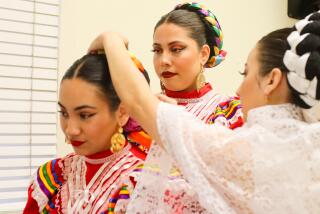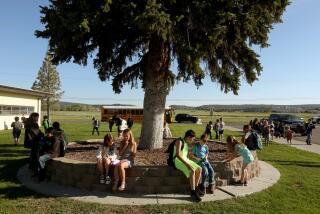A Cultural Test for Islanders, Schools Alike
- Share via
Teachers at Sonora Elementary School in Costa Mesa sometimes have a peculiar problem when they need to call a student’s parents.
Some children are as comfortable in the home of a friend or a cousin as they are in their own. A friend’s parents might be more familiar with both children’s homework routines, while another parent might be responsible for the two friends’ after-school snack. An uncle might be the one who knows all about the dance the friends are learning for a weekend party.
Which adult should the teacher call?
These communal kinships make up just one of the cultural complications at Sonora, where almost 10% of students--about 25--hail from the Marshall Islands, a group of tropical atolls in the central Pacific Ocean. That’s one of the highest concentrations of the islanders in any school in the U.S.
Many of their parents moved to this country so their children could get a better education. Yet a large number of students are ultimately giving up on school while their teachers struggle to understand their traditions.
How do you foster academic excellence in children whose culture may view analyzing and criticizing books as disrespectful? How do you find out about problems the children have in school when their parents might see complaining as rude, a violation of the graciousness they hold dear? And how can you begin to overcome such communication gaps when the Newport-Mesa school district has no Marshallese-speaking educators?
The questions are anything but theoretical: One-quarter to one-half of the district’s Marshallese students drop out before they graduate from high school, according to two Marshallese leaders.
“It seems like the students just give up,” said Rick Graham, president of a Marshallese cultural club.
School officials don’t keep specific records on the Marshallese, but teachers tend to agree with the dropout estimate.
“The kids either do really well, or it’s the opposite end of the spectrum, where they’re not attending and they’re failing all their classes,” said Michele Kaufman, counselor at Costa Mesa High School, which has more than 50 students from the islands.
This year, Marshallese parents are voicing a new determination to change that. They began meeting this fall with teachers and principals from Sonora, Davis Intermediate School and Costa Mesa High in a search for answers.
Parents, Pupils Show New Determination
Graham, who has worked with school officials on the problem, is especially bothered by the lack of improvement over the years, because a growing number of the 100-plus Marshallese students in Costa Mesa schools were born in the United States and enter school fluent in English.
“Many of these guys were born speaking English,” Graham said. “They should be getting college scholarships.”
Taraur Ria, another parent involved in the meetings, said he believes many problems can be solved if parents get more involved in their children’s schooling.
One promising sign: More Marshallese parents than ever came to back-to-school nights at Davis Intermediate School this year, Principal Cheryl Galloway said.
Some problems have been easily solved. Sonora Elementary School Principal Lorrie Hoggard said she learned that many Marshallese parents work at night, which makes it difficult for them to attend parent meetings and back-to-school nights. Some rescheduling was arranged.
Sonora’s teachers have also tried to adapt to their Marshallese students’ concepts of family. For example, they’ve made an exception to the strict rule that only parents can pick up their children to allow one Marshallese adult to leave with all the Marshallese students.
In the Marshallese language, the word for “mother” is the same as the word for maternal aunts, according to James Hess, a UC Irvine anthropologist who has studied Costa Mesa’s Marshallese. This linguistic difference reflects a different attitude in the community toward guardianship of the children, and many adults were frustrated and embarrassed when school officials told them they had no right to take children home, Graham said.
Hoggard also has applied for a grant to hire a Marshallese-speaking community coordinator and wants to offer her teachers a lecture on Marshallese cultural traditions. At Hoggard’s urging, a counselor from Costa Mesa High School will also talk to elementary school parents about how their children can begin preparing for college.
If the graduation rate in Costa Mesa is disappointing, it is worlds better than the situation in the Marshall Islands, where only about 30% of students graduate from high school, according to a recent study of education in the Pacific region.
One issue may be that in Marshallese culture, children learn differently, Hess said.
In contrast to American culture, where nursery rhymes and bedtime stories instill in children the importance of learning to read and analyze books, many Marshallese place a premium on watching how other people do things and learning by example, said Hess, who lived in the Marshall Islands as part of his research.
It’s also possible that Marshallese students are hesitant to analyze and interpret texts--a key component of succeeding in American schools--because in their culture such critiquing could be construed as disrespectful, Hess said.
Another more logistical issue is tardiness. Marshallese don’t place a huge emphasis on being places on time, school officials say. Children are penalized when they repeatedly show up to school late because they or their parents think that five minutes after 8 a.m. is just as good as five minutes before.
Homework is also a problem. Few Marshallese parents have the English skills or the education to help their children. It’s up to English-speaking friends to help them.
Such cooperation comes easily to the Marshallese, they say. For centuries, it helped them survive the harsh life atop the coral atolls just north of the equator in the Pacific.
The Marshall Islands are known to Americans mostly because the U.S. detonated 67 nuclear bombs there in the 1940s and 1950s.
The U.S. government has given all 60,000 citizens of the Marshall Islands permission to immigrate to the U.S. An estimated 5,000 now live in the U.S., most of them in Hawaii, Oklahoma, Oregon, Arkansas and Costa Mesa, according to the Marshallese Consulate in Washington.
Costa Mesa’s Marshallese began arriving in the late 1970s, after a pastor brought a group of island students to study at Costa Mesa’s Southern California Christian School, now Vanguard University. More Marshallese arrive every month and are taken in by the community, who live in three adjacent blocks near Costa Mesa High School and Sonora Elementary School.
Competition Seen as a Foreign Concept
For many Marshallese students, helping each other out is far more important than the competition among students that often flourishes in American schools. This may put them at a special disadvantage when grading is done on a curve, in essence measuring one student against another.
“Here in California, it’s about being the best,” said Augustine Ishoda. “But our heart is like helping each other.”
Ishoda, 22, attended Costa Mesa schools through junior high. His mother sent him back to the Marshall Islands for high school because he was getting bad grades and skipping school.
One day in English class at the island school, Ishoda laughed at another student’s pronunciation, an act of teasing he said was standard behavior in Costa Mesa classrooms.
“Someone came up to me and said, ‘It’s not funny because we are learning.’ ”
That made him realize that he didn’t like some of the habits he had picked up from American culture. Ishoda said he regrets his wild years as a teenager. Now he’s become a devout Christian and is determined to go to college.
Marshallese culture also places a great emphasis on being gracious and polite, meaning that, until now, parents have been unwilling to come to school officials with conflicts or concerns. “I have not had one Marshallese parent come to me to talk about anything,” said Galloway, principal at Davis. “I know we can’t be doing everything perfectly, so I think there is a real reluctance on their part to come.”
Some Costa Mesa teachers also say they have noticed that Marshallese students tend to be reticent in class, which can be taken as a lack of understanding or interest.
But Marshallese parents and students say their culture abhors know-it-alls and showoffs. Children who raise their hands a lot in class or try to appear smarter than others might be looked down upon.
“You cannot be a Muhammed Ali in our culture,” Graham said. “No way. That is not accepted. Everyone would hate you.”
But Graham said he knows that to do well in school one must participate in class. “For my son, I tell him, raise your hand, because that’s the only way you will get the answer.”
Other parents expressed worry that school officials are not challenging Marshallese students enough because they misinterpret shyness for apathy, or even a lack of intelligence.
Ria, who has seen three of his children graduate from Costa Mesa High School and go on to college, said students placed in remedial elective classes might believe they are inferior and stop trying.
“I think one of the reasons kids are dropping out school is no one is really motivating them,” he said.
He said his daughter Laura, 18, excelled when she was able to take classes at Orange Coast College while still at Costa Mesa High.
“She got really motivated and spent more time on studying because she knows she has to,” said her mother, Lilly Ria.
Laura, now a full-time student at OCC, said she wants to become the first Marshallese-speaking teacher in Newport-Mesa schools. She says she will give other Marshallese students something she didn’t have: an instructor who understands.
More to Read
Sign up for Essential California
The most important California stories and recommendations in your inbox every morning.
You may occasionally receive promotional content from the Los Angeles Times.













